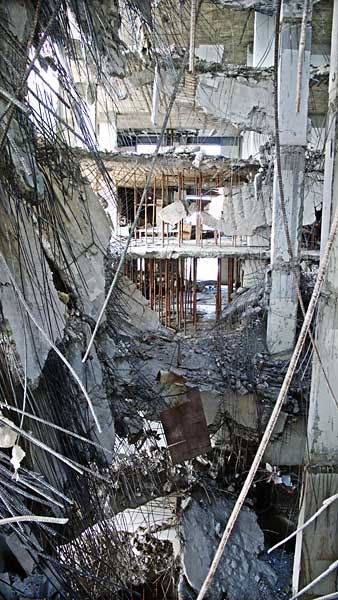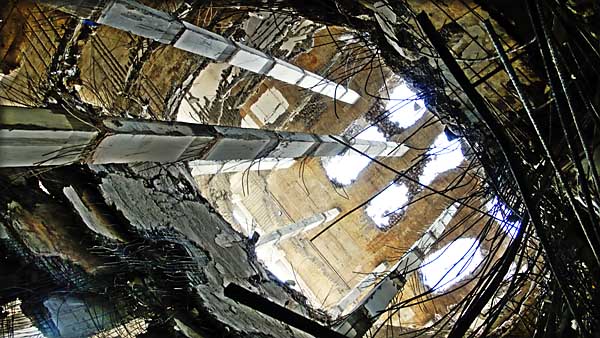![]()
![]()
The newly appointed education adviser has my sympathy. He had spoken the truth. With scandals emerging about departing advisers, and accusations flying about the gross incompetence of the ‘PhD’ government, he must have felt the need to demonstrate the character of the cabinet.
Having lost the Candy Man, we now have an adviser who is candid in his remarks. “Regardless of the verdict of the court, the teachers shall be freed, ” he had said. Great news for the teachers. Sad news for justice.
But the candor of the education advisor is unlikely to inspire confidence in the government. He might equally have said, “regardless of the verdict of the court, we shall find Sheikh Hasina and Khaleda Zia guilty,” or any other convenient outcome for the many flimsy cases against politicians, business people, students or any other member of the public. The fact that the government finds the judicial system irrelevant, while confirming people’s fears, does do away with their flicker of hope for justice. This was a lamp that needed to stay lit.
The anniversary party could have done without the media gatecrashers. The weeks leading up to the 11th January 2008, have been particularly difficult for the government. In August, it had taken violent protest by the students for the military presence in campus to be removed, but it is the fallout of the government’s heavy-handed response that they now need to deal with. Having closed the 24 hour news channel CSB
 24 hour CSB News TV channel after its closure. Dhaka. Bangladesh. ? Kakoli Prodhan
24 hour CSB News TV channel after its closure. Dhaka. Bangladesh. ? Kakoli Prodhan
and intimidated others with barely veiled threats, they had expected an easy ride. But they had reckoned without the spunk of Bangladeshi media. BTV has long since become irrelevant. Cheek in jowl, private channel media activists have found creative ways to get the news to the public, and an informed audience has responded. I remember the phone calls ‘from above’ that came in while a talk show was going on. The savvy presenter responding smartly toned down his own questions, letting me speak as I pleased. It was a live show, and he could hardly have been blamed for the words I was using. The phone calls to the editor, the ‘invitations to tea,’ and the physical presence of army personnel have made honest reporting a harrowing task, but the news programmes are alive and well, and while they have economic pressures, they retain a loyal following.
Even newspapers that had decided to ride in the comfort of the military train are having to make face-saving critiques of a government facing derailment. It is the government, which is on the back foot. CSB is still closed, but the phone in callers, the letter writers, the bloggers and the talk show speakers have joined in the fray. This is media at its best.
Amnesty’s Secretary General, Irene Khan, made up for her initial failure to denounce emergency rule, “Amnesty believes that the government can waive some of the restrictions, even under emergency rule.” The media again had set the tone. She was far more forthright in the latter stage of her visit and pointed to the ubiquitous presence of the military in all public spheres, clearly stating that military rule was unacceptable.
I could smell the stench of decomposed flesh as I walked up the stairway of the partially demolished Rangs Building.


Loose concrete slabs and boulders still dangle precariously from the remaining metal rods of the Rangs Building. ? Shahidul Alam/Drik/Majority World
 Even in this unsafe condition, and while the body of a security guard is still buried under the rubble, workers remove rubble from the partially demolished Rangs Building. ? Shahidul Alam/Drik/Majority World
Even in this unsafe condition, and while the body of a security guard is still buried under the rubble, workers remove rubble from the partially demolished Rangs Building. ? Shahidul Alam/Drik/Majority World
The Rajuk administrators were themselves scared to be there, but being government officials they had little choice. They pointed me to a staircase that was relatively safe. Workers, not having my benefit of class, climbed the more dangerous ones. I wonder how it feels to walk past a deceased colleague, past the stench, the rubble, past rickety columns. What is it like to know one’s death will only matter to one’s nearest ones.
Yesterday police turned their batons on garment workers demanding outstanding wages and fires yet again engulfed city slums.
 Fire in Rayer Bazaar slum destroyed around 2500 homes. January 12 2008. ? Munir uz Zaman/DrikNews
Fire in Rayer Bazaar slum destroyed around 2500 homes. January 12 2008. ? Munir uz Zaman/DrikNews
 Garment worker killed by collapse of factor building. ? Shehabuddin/Drik/Majority World
Garment worker killed by collapse of factor building. ? Shehabuddin/Drik/Majority World
The recent deaths of other garment workers and general demands to receive an acceptable minimum wage, all point to the disengagement from the public of a caretaker government that has failed to care.
We are in need of honest answers, and while the new education adviser revealed the government’s complete disregard for the judiciary, I suspect his honesty was the unintended byproduct of yet another exercise in spin. If on the other hand, his admission of the irrelevance of the judiciary was the beginning of a process of transparency, unpleasant though the truth might be, I welcome it. Admission of guilt does not in itself solve the problem, but it does begin to address it. Something they have so far singularly failed to do. They have blamed the ills of the nation on politicians and political parties. On bad democracy. The people are in no illusion about the improprieties of the past. But bad democracy can only be replaced by good democracy. There is no such thing as good autocracy, and pliant front men, no matter who they are backed by, can never be an answer.
One thought on “Keeping the lamp lit”
Leave a Reply
You must be logged in to post a comment.

very pretty blog btw. isnt it a bit hasty to cast the Education chap as the new fall guy. let him settle in for a bit!!
The option of releasing them doesn’t have to be interpreted as utter capitulation to the mob. If they are found to have crossed the limits they can be released from their employment contracts. Of course such a judgment will be regarded as ‘antipeople’ because the incarcerated are well loved by their supporters, but thats how we are. Anything the govt do will be seen as hostile and revoltingness worthy.
In fact its apprehension of this firing option that i feel is behind the latest ‘dignified release’ demand of the campaigners. The government spins in foreknowledge of the media and special interests own spin on gruesome national events like rangs. (Interesting that they have a BUET supersub on the pitch at the moment)
good democrats will have their chance. Were you on Banglavision by any chance?